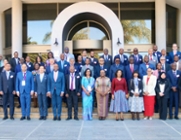Reflections on CLGF in Southern Africa

23 September 2020
CLGF's Programme Manager for Southern Africa, Ms Nyasha Simbanegavi, looks at the implementation of the regional programme in the time of COVID-19; and how it is contributing to poverty reduction, in line the with Sustainable Development Goals (SDGs).
CLGF and its members in Southern Africa are contributing to poverty reduction within the context of the SDGs, through the implementation of the Southern African Regional Programme. This is a long-term plan of action, drawn up in consultation with members and involving different countries and themes, all relating to different aspects of the SDGs. The programme is supporting the decentralisation process, local economic development (LED), and the participation of women in public and economic sectors in Botswana, Eswatini, South Africa, Zambia and Zimbabwe. COVID-19 came at a time when CLGF and its members had reflected on the programme’s achievements, during the Lusaka Regional Conference in June 2019.
The regional programme has brought about change to target communities, and some of the programmes notable achievements include:
- enhancing good local governance and increased citizen participation in local government;
- increasing local economic development activities and investment;
- increasing women's participation in politics and economic development; and
- strengthening capacity for effective and efficient service delivery.
The programme has also enhanced regional peer learning and exchange.
The stark reality of the impact of COVID-19 is that it transcends health. According to the Goalkeeper’s Report 2020, COVID 19 has stopped 20 years of socio-economic progress towards the achievement of the SDGs in just six months. It is affecting our societies to the core.
Given this, CLGF members in the region have been at the coalface of fighting the pandemic and the regional programme is expected to support the post-COVID-19 recovery efforts. The pandemic has emphasised the existing challenges faced by local governments, which include: inadequate funding, unclear/overlapping mandates, inadequate service delivery, and local government capacity among others. Equally, the pandemic has amplified the importance of local government in socio-economic development in line with the SDGs. In response to the pandemic, CLGF has adapted the regional programme and this will continue to support the COVID-19 recovery programmes of members, going forward.
CLGF member responses to COVID-19
Ministries responsible for local government have generally been charged with the role of disaster management and coordination of the pandemic, amongst other responsibilities. Local and regional governments are leading the fight against COVID-19 through the coordination of emergency services at the local level, delivery of services, and dissemination of information. Local government associations are coordinating their members, as well as raising awareness of COVID-19 issues.
The South Africa Local Government Association (SALGA), the Local Government Association of Zambia (LGAZ), and the Urban Council Association of Zimbabwe (UCAZ), for example, have all been at the forefront of the COVID-19 response in their respective countries. CLGF associate members, such as the Dullah Omar Institute (DOI), have also played their part through hosting webinars, including highlighting the impact of the pandemic on decentralisation. COVID-19 has amplified the following challenges facing local government in the region.
- Inadequate funding has been compounded by the loss of revenue due to the lockdowns effected by governments in the fight against COVID-19. One example is in Gauteng Province in South Africa where, as at 1 September, the municipalities have lost a cumulative total of ZAR 8,6million, according to the Gauteng’s Department for Cooperative Governance and Provincial Government.
- Unclear/ overlapping mandates and inadequate institutional arrangements for effective service delivery have been magnified in the management of the COVID-19 crisis.
- The already existing inadequacy in services, both in terms of quality and quantity, has been highlighted. The call for universal access to services, including water, housing and health, which are critical to successfully fight the pandemic, has never been clearer and louder. The pandemic has added emergency preparedness to the long list of capabilities that local governments require to effectively serve communities.
Despite the challenges highlighted above, the role of local government in the achievement of the SDGs, and responding to disasters and emergencies, has been firmly reinforced. COVID-19 is amplifying the importance of local government, particularly in the provision of adequate service delivery.
In addition to social services, the economic devastation caused by COVID-19 requires a coordinated economic response, including through the promotion of local development.
Adapting the regional programme to COVID-19
The resilience and zeal of CLGF members and staff to implement the programme during the pandemic has been heart-warming. Staff and members, alike, have adapted the programme to ensure that the implementation of activities has continued safely. The COVID-19 adaptation initiatives include moving project meetings and training activities online; facilitating platforms for project beneficiaries to network virtually; safe implementation of project activities; and using the programme to support members' economic recovery programmes. CLGF members have also continued to support, enable and facilitate the safe implementation of the programme, even during the lockdown.
Ingredients for continued programming during the pandemic
Programming during COVID-19 has emphasised the importance of project beneficiary ownership, flexibility, responsiveness and partnerships. Project ownership is critical and CLGF members and staff were able to adapt the programme to COVID-19 within two months because beneficiaries owned the projects. Also, flexibility in ensuring that programmes and projects respond to the needs and priorities of beneficiaries enabled us to continue to programme, despite the risks that COVID-19 presented. Finally, working in partnership with CLGF members has ensured the continued implementation of activities, despite the strict lockdowns that have been put in place in response to COVID19.
The next phase of the regional programme is critical to the region’s post-COVID 19 recovery plans. Given the social and economic devastation that has been caused by the pandemic, there is need for continued support for decentralisation processes, LED and the participation of women in public and economic sectors. The CLGF team looks forward to engaging members on their priorities for future programming. The next phase of the programme is critical to the region’s recovery.
Back to News





